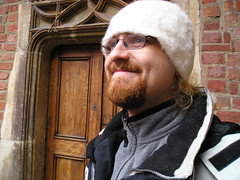Unpublished, but worth a read
The British Labour Party’s third, but significantly reduced, majority was marred by electoral mishaps. British newspapers are full of stories about ghost voters, people receiving duplicate polling cards giving some the chance to vote more than once, and voter fraud by mail occurring during the May 5 vote.
Canadian students studying in England are mixed up in the thick of it.
“I voted Liberal Democrats,” says Patrick Bennett, a Master’s student in Urbanisation and Development at the London School of Economics in London, England. A citizen of Montreal, Quebec, Patrick was as surprised as anyone to find a polling card in his mailbox claiming that he could vote.
“I didn’t really have time to consider how weird it was that I got to vote,” he says, “I just took advantage of the fact that I could.”
James Keirstead, a DPhil student in Geography at Oxford University, also cast his ballot, but not for Labour, he says. “They’ve done some good things, but from a policy perspective they’ve become a bit complacent and haven’t achieved as much as I think they should have given two strong majorities in 1997 and 2001,” explains Keirstead who wouldn’t reveal for whom he voted. Home is Nova Scotia for him, but he’s been living in England, off and on, for four years.
Canadians weren’t the only foreigners able to cast a ballot. All commonwealth countries have the same right. According to Directgov, a government-run service set up to make accessing government easier, there are 54 member countries of the commonwealth, an organization they describe as a “voluntary association of independent states, nearly all of which were once British territories.”
The vagaries of British elections are a result of the 1918 Representation of the People Act, which made all British subjects eligible to vote. At the time of passage, Canadians were British subjects, and no one has bothered to amend the Act to exclude us. According to Directgov, to be eligible to vote in British elections non-Britons need to be members of a commonwealth country and meet one of two criteria: Entitled to vote are “[s]tudents who live in Britain in term time or during vacations,” or “[p]eople who have second homes in this area.”
According to Mary Anne Dehler, an officer at the Canadian High Commission in England, the High Commission received only one enquiry about whether or not Canadians can vote in this election from a Canadian. Meanwhile, Christopher Berzins, Political Officer at the Canadian High Commission, explains that he is “neutral” on his right to vote in British elections as a Canadian, and says didn’t mark an ‘X’ in this one.
Jonathan Ezer, a Ph.D. student in Information Systems and Chair of the Canadian Society at the London School of Economics, boosted the Labour vote. He says Labour got the ‘X’ because Tony Blair is an “excellent statesman,” and foreign issues are of greater concern to him than domestic ones.
Ezer thinks granting commonwealth citizens the vote is a great way to invigorate a relationship with Brits, but he doesn’t think the Canadian vote had much of an impact. Most, he says, don’t even know they can vote and those who do, don’t bother.
Either that, or they felt it wasn’t right to cast a ballot in what they consider a foreign country. “The reason I didn’t vote was because I leave the U.K. for good in four months,” says Lauren Rowohlt, a corporate health and fitness instructor in London who hails from Perth, Australia. “I honestly don’t believe I should have a right to vote here since I won’t be affected by the outcome.”
That sentiment is widely shared amongst Britons, who say “bollocks” to the lot of it. Daniel Freedman, a writer with the Wall Street Journal Europe, thinks most Brits would find this electoral fact “distressing.”
“Why should Canadian residents be allowed to vote,” asks Freedman, “and not American or Italian?”
John Blundell, director of the Institute of Economic Affairs, a prominent free market think tank based out of London, England, says that this is another sign of the British electoral system’s openness to corruption. Few voters get checked, he says, and while Canadians may have little impact on the election given their numbers, with postal ballots the Brits are “entering a new era of major scandal.”
Freedman and Blundell don’t get a say in our elections directly, but the Queen does. The position of governor-general, now filled by Adrienne Clarkson, is as an official representative of the Queen. Other than getting a sumptuous 20 million dollar per year budget to traipse around the world with Canadian artists, poets, and Olympians in tow, she also has to sign each piece of legislation that passes the House of Commons. In theory, she can choose not to sign the legislation, and kill a bill.
If ever she were to, that scandal would probably end our monarchist ties.





0 Comments:
Post a Comment
<< Home